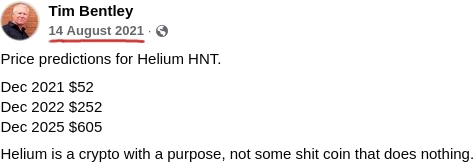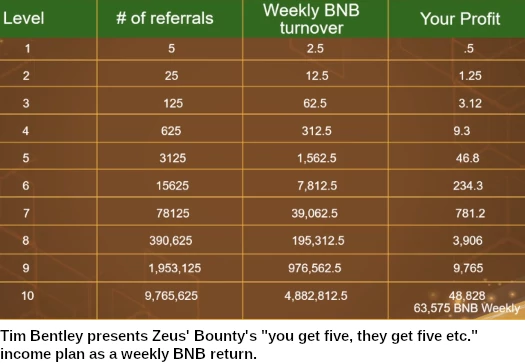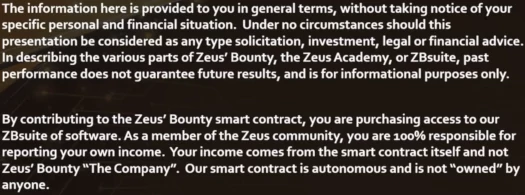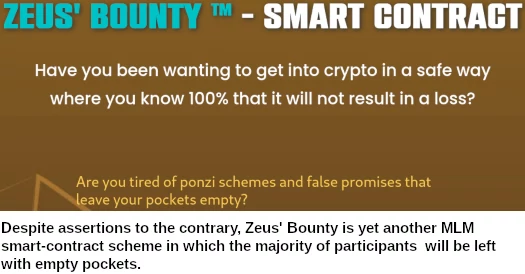Zeus’ Bounty Review: BNB smart-contract pyramid scheme
 Zeus’ Bounty provides no information on its website about who owns or runs the company.
Zeus’ Bounty provides no information on its website about who owns or runs the company.
Zeus Bounty does however claim its admin team has “100 years of combined business experience (with) 100+ crypto scams”.
If you want company ownership information, you have to watch Zeus’ Bounty’s embedded marketing video.
In the video Tim Bentley crediting himself as “the creator of Zeus’ Bounty”.

According to his FaceBook profile, Bentley is based out of Colorado in the US.
Prior to founding Zeus’ Bounty, Bentley was promoting iHub Global.

Bentley appears to have reinvented himself as a crypto bro circa 2015.
Zeus’ Bounty’s website represents the company has four admins.

Bentley identifies them as Nicole (his wife), Nico (his son) and Raaj Menon.
According to his LinkedIn profile, Raaj Menon is a web and crypto bro dev from South Australia.

Whether Menon has an MLM history is unclear.
Update 7th February 2022 – As revealed by Daniel Toth in the comments below, Raaj Menon is behind the “Crypto Passive” YouTube channel:

Menon has used Crypto Passive to promote one crypto scam after another over the past eleven months. /end update
Zeus’ Bounty’s website domain (“zeusesbounty.com”), was privately registered on October 22nd, 2021.
Read on for a full review of Zeus’ Bounty’s MLM opportunity.
Zeus’ Bounty’s Products
Zeus’ Bounty has no retailable products or services.
Affiliates are only able to market Zeus’ Bounty affiliate membership itself.
Participation in Zeus’ Bounty’s MLM opportunity as an affiliate provides access to “Zeus’ Academy”.
Zeus’ Academy contains various marketing and cryptocurrency education courses, as well as the “ZB Software” marketing suite.

Zeus’ Bounty’s Compensation Plan
Zeus’ Bounty’s compensation plan combines passive commissions with unilevel team pyramid recruitment.
There are five buy-in tiers for both components of Zeus’ Bounty’s compensation plan:
- 0.1 BNB
- 0.5 BNB
- 1 BNB
- 5 BNB
- 10 BNB
Here’s how those tiers pay out across Zeus’ Bounty’s compensation plan.
Passive Commissions
Zeus’ Bounty takes 50% of invested BNB and uses it to pay passive commissions.
Zeus’ Bounty’s passive returns pays 2.5% from both upline and downline affiliates.
This 2.5% is paid on whatever is invested by these affiliates across any BNB tier.
Affiliates paid on are those who joined Zeus’ Bounty before and after you. Affiliates who join after you can be directly or indirectly recruited.
How many up and downline affiliates a Zeus’ Bounty affiliates earns 2.5% off, is determined by how much they themselves invest.
- 0.1 BNB tier affiliates receive 2.5% of the buy-in from five upline and downline affiliates
- 0.5 BNB tier affiliates receive 2.5% of the buy-in from six upline and downline affiliates
- 1 BNB tier affiliates receive 2.5% of the buy-in from eight upline and downline affiliates
- 5 BNB tier affiliates receive 2.5% of the buy-in from nine upline and downline affiliates
- 10 BNB tier affiliates receive 2.5% of the buy-in from ten upline and downline affiliates
If a Zeus’ Bounty affiliate upgrades their BNB tier, they are retroactively paid 2.5% of up to 10/10 upline and downline investments.
Unilevel Commissions
Zeus’ Bounty uses the other 50% of BNB buy-ins to pay recruitment commissions via a unilevel compensation structure.
A unilevel compensation structure places an affiliate at the top of a unilevel team, with every personally recruited affiliate placed directly under them (level 1):

If any level 1 affiliates recruit new affiliates, they are placed on level 2 of the original affiliate’s unilevel team.
If any level 2 affiliates recruit new affiliates, they are placed on level 3 and so on and so forth down a theoretical infinite number of levels.
Zeus’ Bounty caps payable unilevel team levels at ten.
Recruitmentment commissions are paid out as a percentage of BNB buy-ins across these ten levels as follows:
- level 1 (personally recruited affiliates) – 20%
- level 2 – 10%
- level 3 – 5%
- levels 4 to 6 – 3%
levels 7 and 8 – 2% - levels 9 and 10 – 1%
New Member Weekly Bonus
Zeus’ Bounty sets aside “3.5% of the company’s profits” and pays it out to all new affiliates who’ve signed up over the previous week.
1 BNB Tier Bonus Pool
Zeus’ Bounty sets aside “7% of the company’s profits” and pays it out to new affiliates who’ve signed up at the 1 BNB tier each week.
10 BNB Tier Bonus Pool
Zeus’ Bounty sets aside “7% of the company’s profits” and pays it out to new affiliates who’ve signed up at the 10 BNB tier each week.
Recruiter Bonus
Zeus’ Bounty sets aside “14% of the company’s profits” and pays it to the company’s top thirty recruiters each week.
Minimum recruitment requirements to qualify for the weekly Recruiter Bonus is two personally recruited affiliates the previous week.
Withdrawal Restrictions and Fees
To keep as much BNB in the smart-contract as possible, Zeus’ Bounty restricts affiliate withdrawals.
Zeus’ Bounty withdrawals are restricted either based on personal recruitment of total BNB spent on buy-ins.
- if you have less than four personally recruited affiliates, 60% of all withdrawal requests must be spent on BNB buy-ins
- if you have four personally recruited affiliates, 50% of all withdrawal requests must be spent on BNB buy-ins
- if you’ve spent 4 BNB on buy-ins, 40% of all withdrawal requests must be spent on BNB buy-ins
- if you’ve spent 10 BNB on buy-ins, 30% of all withdrawal requests must be spent on BNB buy-ins
I believe these conditions are mutually exclusive, meaning you can just spend 10 BNB on buy-ins and not have to worry about recruitment and vice-versa.
On top of withdrawal restrictions, Zeus’ Bounty charges a 7% withdrawal fee.
Joining Zeus’ Bounty
Zeus’ Bounty affiliate membership is free.
Participation in the attached income opportunity requires an initial 0.1 to 10 BNB buy-in.
Full participation in Zeus’ Bounty’s MLM opportunity costs 16.6 BNB
Zeus’ Bounty Conclusion
 In the official Zeus’ Bounty marketing video, Tim Bentley (right) claims he’s
In the official Zeus’ Bounty marketing video, Tim Bentley (right) claims he’s
recently been burned by smart-contracts. In fact I’ve been burned by a lot of crypto programs in the past.
It seemed like everything I got into after 2015 was some kind of rug pull or crypto scam.
Bentley goes on to state Zeus’ Bounty came about after he “set out to create something better”.

What Bentley has learned is it’s profitable running MLM crypto scams. Math guarantees participating in them will more than likely lead to losses.
Although I’ve marked Zeus’ Bounty as a pyramid scheme, it does have elements of a Ponzi scheme.

This is a quote from Bentley, made in an official Zeus’ Bounty marketing video;
If you come into this program and you’re looking for passive income, you can expect to earn more money than if you put your money in the bank.
That’s not saying a lot. A lot of these banks pay like 0.5% a year on your money … so you’ll earn more money than that.
We’re going to give you an up and downline and pay your passively.
The Ponzi nature of Zeus’ Bounty occurs by way of receiving 2.5% of past and subsequent buy-ins.
Withdrawal requests are attached to mandatory buy-ins (forced reinvestment), allowing those who get in early to earn a passive return over time.
The rest of Zeus’ Bounty is a standard pyramid scheme. Commissions are paid on recruitment, which is required to keep the 2.5% passive returns flowing.

Without new affiliates being fed into the bottom of the pyramid, Zeus’ Bounty’s smart-contract stalls.
If we were imagine the flow of money within Zeus’ Bounty and zoom out, we’d find the majority of BNB invested flowing upline.
At the top of that upline are the admin positions Bentley has created for himself, his family and Raaj Menon.
From a regulatory standpoint, the passive returns nature of Zeus’ Bounty constitutes wire fraud. This is a violation of the Securities and Exchange Act, regulated by the SEC.
The pyramid side of Zeus’ Bounty falls foul of the FTC Act, regulated by the FTC.
This is important, as Tim Bentley is a US resident. Alexa also currently ranks the US as the top source of traffic to Zeus’ Bounty’s website (77%).
In an attempt to legitimize fraud, Bentley offers up the following disclaimer in official Zeus’ Bounty marketing videos:

With respect to the first paragraph, you can’t disclaimer your way out of running a Ponzi pyramid hybrid scheme.

There is nothing in the Securities and Exchange Act or FTC Act that provides an exemption to fraud if you add a boiler plate “not financial advice but have a look at my scam” disclaimer.
The second paragraph infers that adding products and services to a scam legitimizes it.
The SEC addressed this in 2016, affirming that what you add to a fraudulent scheme doesn’t matter.
Zeus’ Bounty’s business model is what makes it a scam. Anything added to or bundled with that is irrelevant.
Finally the last sentence;
Our smart contract is autonomous and is now “owned” by anyone.
This is just a flat-out lie. Tim Bentley created Zeus’ Bounty. He owns it, including the smart-contract.
From a participation standpoint, as with all MLM pyramid schemes, math guarantees the majority of Zeus’ Bounty affiliates will lose money.

Forced buy-ins, fees and bonus pools might make this a slow bleed, but at the end of the day Bentley is still just shuffling around a fixed pool of BNB.
When recruitment dries up that pool dwindles. Math kicks in and sorry for your loss.
Update 13th February 2022 – Tim Bentley is now pitching an NFT game he’s called Zeus’ Chariots.
Update 19th August 2022 – Tim Bentley is now funnelling Zeus’ Bounty affiliates into a gambling scheme he’s calling the Simple Dutch System.
Update 7th July 2023 – Zeus’ Bounty’s official YouTube channel was terminated sometime over the past month.
This prompted BehindMLM to revisit Tim Bentley’s schemes. As of July 2023, we’ve called Zeus’ Bounty’s and Zeus’ Chariot’s collapse.


In a recent “opportunity” video, Tim announced that he will be adding a coin and NFTs.
The NFTs will build a virtual structure that looks like a colosseum where there will be “chariot races.” I will be reviewing the video on my channel and tell you more once my memory is jostled.
Dan Mahedy JR, from AZ according to his FB profile, is one of the early “Zeusers.” He arrived in my chat on the first stream I did about Zeus and Tim made comments on the video afterward.
One of my subs, who has been following scams like Onpassive, replied to him. Thanks for covering this scam Oz.
When are grown men going to stop using NFT kiddie mobile games as a front for money laundering?
This cartoon NFT shit is starting to feel, y’know…
You have no idea what you are talking about. Your site is the biggest scam in the space. You claim every MLM out there is a scam. YOU ARE THE SCAM!!!
You are also slandering me and my company. Shame on you.
Hi Tim, thanks for stopping by.
And what slander would that be? You’re running a pyramid scheme.
Nah. Just the scams. If you’re knee-deep in fraud though I can see how looking up reviews on BehindMLM might lead you to thinking we only review scams.
That’s more of a “you” problem though.
FBI, OPEN UP!
Nah,just the majority because surprise surprise – they are majority scams
There are a few surprising MLMs that are actually legit and he reviews as such.
Angry scammer says what now
You don’t even know the difference between review and slander,and you “run a company”. Not inspiring confidence there chief
@Oz: Could references to commissions from “upline” and “downline” actually mean “left” and “right” in a binary tree? I remember another scam that did something similar: Lyoness. They called left/right bottom/top, just to be cute, I guess.
It’s just a thought. Either way, this scheme has pyramid/Ponzi written all over it. I think my favorite part was “Earn passive income! NOT a solicitation!” Uh huh.
In this case it refers to a straight-line genealogy.
Just a queue of whoever joins and you earn a 2.5% cut of people who joined before and people who join after.
The old-school matrix pyramids used to add it so they could claim you’d earn something no matter what you did in the company.
This is that but on dUh BlOcKcHaIn!
Tim – you are running a scam.
How do you propose people are making passive income when you run out of gullible rubes, Oh I mean… ‘recruits’? Piddly returns on BNB is not going to cut it.
Also – pretty disingenuous how you ‘explain’ Smart Contracts.
You’re just hoping people who join your Ponzi Scheme have no clue about crypto trading.
Keep up the good work, Oz – from a fellow Aussie.
Oh, OK. I was stuck trying to figure out how it could work as a hierarchy, because more than 40 direct recruits at 2.5% each would be more than 100%. Thanks for the clarification.
Tim, this site has covered schemes, scams, and Ponzi’s, which have come and gone as soon as they got started for many years.
Many claim “This is the most exciting blah, blah, blah,… We’re different blah, blah, blah, …” and then they’re gone within a year or two.
Out of all of the “opportunities” which have been reviewed here by Oz, not very many can claim they have stood the test of time.
The rest just drop off like mosquitoes in a pond of water.
Many attempt to escape their short/ugly past by rebooting under a different alias. But it’s all the same game.
Not much has changed over all these years except the victims.
These days, crypto schemes are a dime a dozen.
Thank you so much for helping The Recovering Hunbot and myself speak out about this scam!
Tim admits he is running a ponzi scheme and needs to come up with products! They are a new MLM and we plan on following them and reporting them to the appropriate places to have them investigated and hopefully shut down.
It is hilarious to me they brag about their scam experience. The entire “company” is worrisome.
Thanks for this article though! I appreciate this website a lot and use it often for my channel. So seeing this company pop up was fabulous!!
Thanks for all the amazing work you do on this site. Much love to you!!
When someone who starts a scam calls a critique a scam is always amusing. Not exactly sure how a critic who analyzes a “company’s” messaging and structure is a scam.
Tim had to know being in the crypto MLM space would not be smooth sailing and people who speak out against unethical businesses would be side-eyeing his set-up.
Queen of Spade and I will continue monitoring how long this one lasts. I do not expect it to be that long.
It’s the equivalent of:
“Oh look, it’s a bus.”
“YOU’RE A BUS!” *starts frothing at the mouth*
“H’ooookay. *backs away cautiously*
First off..Nobody owns Zeus’s Bounty it runs autonomously on its own.
Second, Tim Bentley is the creator and he proudly puts his face up front on everything we do.
His face is right at the top of the website and he have conducted all of our zoom meetings except for one that I know of, and his picture and name on every email I’ve received so.. If you can’t find him YOU ARE LAZY AND YOU JUST AREN’T LOOKING.
Lastly, we are rolling out a suite of software, some of which has been released already and the software sales and software licenses will drive the Zeus Platform.
To that extent people have a choice weather to use the software by contributing to the Zeus Platform one time or they can pay for use of the software by way of subscription.
We will have many desirable softwares ready very soon. People who choose to sell this software will enjoy 40% commissions. Not one time but for as long as the person they sold to uses it. Monthly commossions.
So now HOW ARE WE A PONZI AGAIN??
What you are doing is Slander and I would encourage you consider removing this or (Ozedit: derails removed)
If there’s a scheme here you are the schemer not us.
I do not speak for anyone else in Zeus’Bounty but myself.
I own a construction company and Zeus’Bounty has been great extra income.
So sad idiotic people would have you believe otherwise.
Tim and his family are great people and you..
Well, you suck!
Herp derp. Herp herp’a’derp. Herpity derp, derpity herp, derp herpa herp derp.
It wasn’t at time of publication. Hiding MLM company ownership information is a potential violation of the FTC Act.
The review states Zeus’ Bounty is a pyramid scheme. Why? Because there’s no retail, making all commissions paid out tied to recruitment.
Didn’t you read the review?
Facts aren’t slander.
Regardless of whether Tim and his family is great, Zeus’ Bounty is a pyramid scheme.
Running a pyramid scheme makes Bentley a scammer.
Ah so it wrote itself and made its own website? Thats super cool man!
Which is the IHub global scam,and now Zeus
Cool stuff,at least you make it easy to keep track of your scams
Fake compliance is not compliance. Remove the unregistered passive income from your site or register it properly. Stop hiding chickens
While it’s difficult to explain in a way even imbeciles would grasp,you have no income generation except for other suckers paying to get an income from you
Pretty sure the FTC would like to have a chat about your income claims on your facebook page – ask iGenius how well that’s working out for them
Classic “Jealous” cultist mentality
I’m sure your Facebook friend Timmy echoes your flaccid sentiment,you also said “We” earlier so i’d be worried when the cops come knocking eventually you implied you are part of the development process
Maybe you should focus more on doing actual work and less on supporting fraud
Sticking your hand up in irony for being bad at money and business is hilarious
Meanwhile building your entire family’s income on fraud is totally not sketchy
In summary,go back to hucking NFTs. Maybe read a book on financial principles. Smell some flowers
As I explained. Nobody owns Zeus’Bounty. It is possible to create something and then let it exist on its own without owning it. A child for instance.
We have a full blown suite of next-generation software launching therefore we have a product. We are not a pyramid.
And GENIUS.. if you would’ve taken any time to research Raaj you would of found that prior to joining us he actually devoted a ton of time debunking platforms prior to ours that actually were scams under the name Crypto Passive on YouTube. So just having this man with us should reassure people if it does anything.
Again.. poor research on your part at best.
Yes Daniel we get it, second incarnation of jesus yadda yadda products are coming one day yadda yadda.
So by your own admittance you are currently running a pyramid scheme,and some time in the future adding a layer of fake compliance ontop. Noted.
Thing is though,why are you glossing over the illegality on your own Facebook profile in the form of income claims, as well as the “Program that has no owner but miraculously came into existence” that also is not compliant – like an immaculate conception I guess too.
Two other quick points.
1. It’s a one time contribution ranging from .1 bnb to 10 bnb to gain access to our software but it will also be available on a subscription basis and you need not enter the platform.. You don’t contribute at each level so your numbers are off too.
The last thing I want to say to you is this..
If you were even close with your.. JEEZ, I wish I could call it research. You would of more than likely joined us than you would be to sit here and trash us.
(Ozedit: derails removed)
Yeah yeah,you got conned in IHub and now you get on top in the immaculately-conceived “Zeus”.
See you in 5 years when your next 30 “platforms” have collapsed.
Enjoy your pyramid scheme.
You mean youtube.com/c/CryptoPassive?
The guy that joins just about every obvious scam in the planet then “updates” his videos when they exit? Hahahahahaha
Hahahahahahahahahahahahahahahahahahahahahahahahahahahahahahahahahahahahahahaha
Oh yeah definitely confidence boosting there
Let’s see he’s got on his youtube:
Investgreen
Mirollex
Rhea Investment
Troncase
Altitex
Platinum Invest
Qubitlife
NCX Bank
Hedges ltd
AX Trader
Pearl Trading Finance
Team Trademiner
Resto Investments
Ultimatecoin
Key Trade
Medtech.biz
VilleCorp
BTTNex
BNBProfit
Recog
Zetbull
Twin Turbotrx
Lifezer
Teqra
SmartBNB
BNBUP
BNB33Club
Baleine
BNB Platforms
ShynXL
Daisy.AI
Moonrat FInance
eOracle
Omega Digital Earn
Coynex
Kriptofuture
Lions Share
Troncore
Arcmoney
IHub Global
SMarthashes
BNBMiner
Cointerra
This is the CV of an imbecile, not somebody to take any recommendations from.
@Oz time to update the article with Raaj the scambuster-by-joining-every-scam’s history
Raaj and Tim probably met at a garage-sale for IHub devices
So Zeus’ Bounty is a sentient being in its own right with equal legal status to a living human (as opposed to an asset or a body corporate).
Please tell us more about how some crypto bros cracked Singularity AI and why they are using it to run a two bit scam instead of taking over the world and winning every Nobel Prize going.
Dude, your Ponzi of choice stole its branding from the fruit machines that desperate people on council estates pump their benefits into, and you’re claiming it’s some sort of independently intelligent superbeing.
Just to tie this off, if you create a human child you may not own it but you are legally responsible for it, and subject to criminal penalties for neglect if you fail in that responsibility.
You can legally transfer that responsibility (e.g. by giving it up for adoption) but you can’t dump it in a box before you’ve done so.
You can quibble over whether ownership is the same thing as legal responsibility but if you’re running a Ponzi scheme it’s not going to get you off the inevitable fraud charges.
Tl;dr version, scamming little fleas shouldn’t have kids.
OT, but this reminds me of a short poem:
Little fleas have littler fleas,
Upon their backs, to bite ’em.
And on those fleas are littler fleas,
And so, ad infinitum.
Having a product does not negate a pyramid scheme. Vemma had products: energy drinks. But their only customers were the people who signed up as associates (and were obligated to buy drinks to qualify for commission), who signed up more aasociates, ad infinitum.
Except it’s not to infinity, because there are only so many people you can sign up.
Once the sign-up rate falters, no one at the bottom of the pyramid has anyone to sell to. But they’re still on the hook to buy product from the company, and in doing so lose money.
That’s why pyramid schemes are illegal: they inevitably stagnate or collapse altogether leaving financial destruction in their wake.
No matter what mighty suites of software you imagine you’re creating, if the majority of buyers are the ones signing up as associates, you have a pyramid scheme running.
That’s not me talking; that’s the FTC. Look up Vemma and Advocare; see for yourself.
The Zeus Bounty website is a blindingly obvious, pyramid-marketing, Ponzi scam; which in itself is highly illegal and can result in prosecution, fines, and a significant prison sentence.
Saying nobody owns it will not absolve you from criminal responsibility when the FBI and the SEC come knocking on your door!
Fools!
You are offering a multi-level compensation plan, which is a pyramid marketing Ponzi scam.
It is also highly illegal and can result in proescution, fines, and jail time.
Good luck when the Securities Exchange Commission and the Federal Bureau of Investigations come knocking on your door!
@Daniel
The creator of a smart-contract scam == the owner of a smart-contract scam.
Adding a product to a pyramid scheme doesn’t make it any less of a pyramid scheme. No retail does.
See FTC v. Herbalife, FTC v. Vemma, FTC v. Advocare etc.
Legitimacy via association isn’t a thing. Zeus’ Bounty is still a pyramid scheme regardless of who Raaj is or isn’t.
For someone who bangs on about research, you’re pretty shit at it.
Blockchain bro dev turns to promoting scams. How… predictable.
I do like how Daniel Toth was like look this guy only joined like 40 scams, obviously he knows what he’s talking about.
Sir…launchING is future tense I am sure as it has not launchED. therefore you do not have a product. YOU HAVE AN IDEA DAN!
Also when you came to our stream you tried to say Zeus wasn’t a Greek God and then I found marketing ads of you displaying he and anyone who joins…as a God.
Can you please explain to me why you joined a company called Zeus’ Bounty if you don’t know who Zeus even is? I’m just wondering…
Now be a good boy and run back to Timmy and tell him we are working on the letters for the FTC. *emoji thumbs up* You like emojis right? All brobots do…
Pyramid scheme is what this so-called company is and I refuse to stop covering it until there is a resolution.
Hopefully we can shut it and get a class action going so the victims can get their money back…
Good luck Dan!! You seem to be deep in this thing and may even be part owner it sounds like…or you just speak for Timmy?
TIMMMMMAY!! Sorry…I am a south park fan and that meme will be made.
Airware is not viable’ products…
I doubt you could even explain what a Smart contract is, Dan.. much like Timmy fails at.
This is a straight up ‘locked up’ resource scam… you pay in – and then, you can’t get any money out due to the arcane withdrawal ‘protocols’… people who participate in this will always lose…
How much money have you sunk into this BS, Dan?
TOP TIP – having someone push a button in the Back Office to fluff the numbers is NOT a Smart Contract…
so explain that to “Zeus’ Bounty is a Trademark of Bronic Enterprises, Inc… Hmmm?
These money for nothing shits really get my Goat…
-Proof, or GTFO…
– Your point? Many shysters have fronted their cons…
– You do know how fucking saturated that market place is, yes? What makes your suite ‘better’?…
Your shitty URL addy shortener is not fucking ground breaking…
– You’re new to this, aren’t you?
– Simple, follow the money…
So show me your P&L statement for the last year – you can blank out all the identifying data – BUT show me how Zeus’ has benefited you – I await…
Let’s see Rubber meet the road… I doubt you can prove any of your claims…
Also – how can you claim Zeus’ is bringing you in money when they have only been around for near on 4 months? And two of those was paying for ads on FB to suck gullible twits in like you, Dan?
And BNB has tanked during that time – when it’s Zeus’ backbone currency?
Is someone telling me some porkie pies here?
Timmy has meanwhile spun off into NFT Fantasy land, as the initial dupes have no fucking idea…
Where he’s trying to sell them on NFTs that will make them money, just by hodling, and ‘renting’ them … *LMAO*
It’s the most hilarious clusterfuck of a Crypto dumpster fire I have ever seen…
Oh did I touch on Timmy running a gambling app without a licence? That too…
Latest news – Timmy is ‘working’ with a ‘Gaming development company’ based out of the Ukraine – that ‘specialises’ in NFT based games – and they have yet to launch their first ‘game’… striper.games…
I need more popcorn…
I had a video of this sent in. Got a few of them to get through after this MTI mess.
wow, you are so full of shit, I just joined a month ago and have made my money back, Zeus Bounty is a secure program and a new fresh idea.
it also has and will have a strong line to marketing products FREE of charge for their members, products like auto responders, web builders and the list is growing, Zeus just lunched a month ago. (Ozedit: derails and abuse removed)
1. Whether you’ve made your money back in a pyramid scheme is irrelevant to it being a pyramid scheme.
2. There’s nothing “new” or “fresh” about pyramid schemes. They’ve been around for decades.
3. Adding crap to a pyramid scheme doesn’t make it any less of a pyramid scheme.
How, when analysing the ZB fee structure, you are always out of pocket…?
I hate to break it to you – the Smart Contract attached to this is just pulling all the ZB fees out of your wallet – nothing more.
There are no ‘products’, bar a shitty URL shortener… and just vague handwaving of future ‘software’ offerings – none of which are market innovators.
Offering ‘trainings’ in crypto is another smoke merchant tactic. When Timmy can’t even explain Smart Contracts, and has no idea about stable coins etc – you definitely are not going to learn anything, other than starting your own crypto scam.
I look forward to you coming back in a few months time, and crying about how you lost your money.
Marcel Marcel, Zeus is promoting a “compensation plan”, which is a pyramid marketing/selling Ponzi scam. Whereby you take money from Peter at the bottom to pay Paul at the top.
And it will all collapse when recruitment of new affiliates dries up, which it will in time.
This is highly illegal.
Sorry for your forthcoming financial loss.
Insider reveals the dirty insides of Zeus’ Bounty in interview with the Recovering Hunbot:
youtu.be/gRqHDM-xdSc
Includes a revealing section on how much Tim’s been skimming from the Ponzi scam.
Thanks. This one’s on my radar.
Tim Bentley is a scammer and hopefully regulators catch up with him one day.
This guy however came off as someone familiar with pyramid and Ponzi schemes but who invested anyway. Seems more upset he didn’t make money as opposed to Zeus’ Bounty being a scam from day one.
That doesn’t change the fact that mathematically he’s a victim. But still.
It’s kinda like, “Hey so I joined an obvious scam and got… scammed. Here’s my story.”
Yeah regardless of his excuses, the depth of info he presents and the glaring skimming of all the funds was quite interesting.
Even that, I was like “Dude, it’s a scam. Tim Bentley launched Zeus’ Bounty for Tim Bentley. What did you think was going to happen?”.
Back in the day admins would make a bunch of secret admin accounts at the top to siphon funds. Now it’s built into smart-contracts.
My favourite part of “It’s a smart contract nobody owns it, it can’t be hacked”.
you’re going to be in for a rude awakening one day.
Now this one from the MLM Hunbot is a bit more interesting, as it has Tim Bentley wrecking himself:
youtube.com/watch?v=dfqHZthJ2QA
My man thinks hiring some artist gives him the rights to Disney’s Star Wars IP lol.
Thematically related (but not related to Zeus)
esquire.com/entertainment/books/a38815538/dune-crypto-nft-sale-mistake-explained/
They found out the hard way buying a produced work is not the same as buying the rights to the source material.
Yeah I remember reading that in the news.
Crypto = dumdums.
MLM crypto = dumbest of the dumdums.
Lol. Bentley thinks 5 million people are going to want to play his NFT slot machine.
“Invest in one of our ~$1000 founder NFTs and earn $48,000 a month!”
Australian scammer Rob Brus (the crypto cartel) and serial scammer Tim Bentley don’t understand scammers building a scam platform…
If you don’t like mountains safe yourself a headache and start at minute 3..
youtu.be/hBYuLlRDL7c
I note ZB has retooled their website – and certain things have ‘disappeared’ – like their who is behind ZB profiles on the front page…
Also – when you click on their Current Live Software links – it’s… erm… interesting…
The testimonials page just made me literally LOL…
Wow, zero comments and 24 views already!
This one’s gonna be yu-u-uge, everybody!
Hey Tim, how well is your illegal Ponzi scan going?